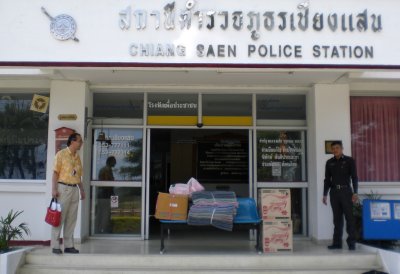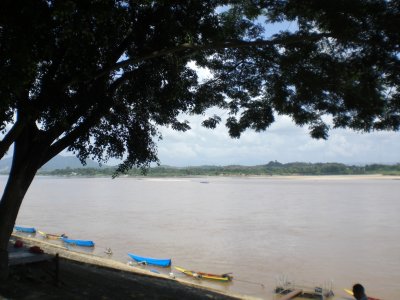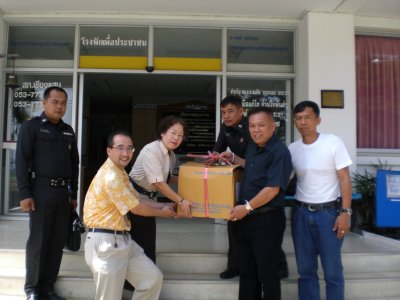Mr. Tomoharu Ebihara and an LFNKR staff member visited the Chiang Saen Police Station in northern Thailand to donate non-prescription medicines, blankets, and other items for North Korean refugees being detained there. Mr. Ebihara works at Thailand-Japan center, Payap University in Chiang Mai and also heads The Association for the Rescue of North Korea Abductees, Chiangmai (ARNKA).

[Click picture for larger view]
The donated aid supplies included non-prescription medicines, 20 blankets and other necessary supplies. |
Thailand is widely recognized as the number two destination country (China, of course, being the first) into which North Korean refugees flee from their fatherland. According to the Thai Immigration Office, about 1,000 North Korean defectors entered Thailand in 2007. Later statistics have not been released, but estimates place the 2008 total at around 1,500.
Thailand's Chiang Saen is one of the nearest provinces to China, geographically, which makes it one of the most popular areas in Thailand for North Korean defectors. This year, the Chiang Saen Police Station had already detained 250 North Korean defectors by Oct. 22, 2009. From January through September the total was only 190, but then the numbers suddenly shot upward. In the first 22 days of October alone, 60 more refugees have been detained.
After the Beijing Olympics ended, the number of North Korean defectors began once again rising. The police in Chiang Saen have, in fact, recently found it difficult to provide adequate supplies and food for the rapidly growing number of North Korean detainees.

[Click picture for larger view]
The Mekong River right in front of the Chiang Saen Police Station. |
After a four-hour drive from Chiang Mai, Mr. Ebihara and I arrived at Chiang Saen Police Station at 11:00am, right on schedule. The superintendent, Mr. Chatarsa, showed us the jail cells exclusively used for North Korean defectors. There were 3 small cells, with 32 people crammed into the central one. Most of the refugees were sitting on the floor, arms hugging their legs.
According to the superintendent, forty North Korean detainees were being held that day, including a group of eight who had arrived just the day before. Most were women in their twenties and thirties. Only three of the detainees were men. There were also two children who had been born to North Korean women by Chinese fathers.
I was relieved to see the respect with which the policemen treat the North Korean detainees. To begin with, the jail cells are not locked. Actually, a few detainees were sitting out in the hallway in front of the doors. I was also glad to hear the superintendent say that the North Korean refugees are not criminals so they have no reason to try and escape from the Police Station. They had turned themselves in, knowing that they would be safe here.
The Police Station staff appreciated the big box we carried in. It contained medicines, including headache and digestive remedies and ointments donated by LFNKR. These supplies will be especially helpful since they are expecting still larger numbers of North Korean defectors as the dry season sets in.

[Click picture for larger view]
Handing the donation to Mr. Chatarsa, the superintendent of Chiang Saen Police Station. The box is filled with medicines for North Korean detainees at Chiang Saen Police Station. |
One of the police officers helping care for the North Korean detainees mentioned that they are running out of sanitary napkins, and the North Korean women are scrambling for them. He also mentioned that it would be nice if the detainees had enough blankets when they sleep, since nights and mornings are starting to become much cooler. So we immediately went out and bought two big cartons of sanitary napkins and also 20 blankets (see photos) in shops near the Police Station.
The superintendent said that he pays 500 baht from his own pocket money to hire an interpreter to interview the North Korean defectors. From his own pocket money! We couldn't help wondering if the South Korean government should be paying for this. I told him that LFNKR would be willing to donate medicines and other supplies again as they need them.
After visiting the Chiang Saen Police Station, we went to the deputy director of the Immigration Office in Mae Sai, which is about 45 minutes from the Police Station. Usually, North Korean defectors are sent from the Chiang Saen Police Station to a court where their cases are heard and then the court hands down a decision (normally a fine).
They are next transferred to the Immigration Office where they wait until they are allowed to go to their desired destinations. Right now, it takes about two months before they can go to South Korea. According to the deputy director, the Immigration Office receives blankets, Korean books and other supplies from the South Korean Embassy, and doctors regularly visit the Immigration Office to provide health care for the North Korean detainees. They have also had to take at least one North Korean woman to hospital to have a baby. The Immigration Office's budget, unlike that of the Chiang Saen Police Station, seems to be sufficient to take care of the North Korean detainees.
Toward the end of our talk with the deputy director, Mr. Ebihara asked if he would meet with a group of foreign lawmakers, all participants at the annual general meeting of the International Parliamentarians' Coalition for North Korean Refugees' Human Rights (IPCNKR) group. This organization will meet in Chiang Mai, Thailand this year, from Nov. 27 to Nov. 29. The deputy director accepted our request on the spot.
According to Mr. Ebihara, they also graciously agreed to the same request last time. It appears that the deputy director's visit to The Hana Institute (established by the South Korean government for the education and care of North Korean defectors) has helped raise local awareness of the issue.
LFNKR very much appreciates the help of Mr. Ebihara, who drove a full 10 hours roundtrip as well as doing all the interpreting. In recent years, LFNKR has been making special efforts to further expand its ties with other related NGOs. This is one more successful example of how the scope of our aid activities is being expanded.


